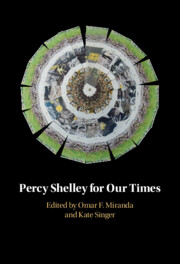Book contents
- Percy Shelley for Our Times
- Reviews
- Percy Shelley for Our Times
- Copyright page
- Contents
- Notes on Contributors
- Acknowledgments
- Abbreviations
- Introduction
- 1 Shelley, Treaty-Making, and Indigenous Poetry
- 2 Waiting for the Revolution
- 3 “A Chamæleonic Race”
- 4 Dream Defenders and the Inside Songs
- 5 Radical Suffering
- 6 Loathsome Sympathy
- 7 Hopeless Romanticism
- 8 Percy Shelley’s Sad Exile
- 9 Shelley in the Overgrowth
- 10 Creatrix Witches, Nonbinary Creatures, and Shelleyan Transmedia
- 11 Action at a Distance
- 12 Educating the Imagination/Defending Shelley Defending
- Further Reading
- Index
5 - Radical Suffering
Shelley’s Legacy in Nonviolent Revolution
Published online by Cambridge University Press: 07 March 2024
- Percy Shelley for Our Times
- Reviews
- Percy Shelley for Our Times
- Copyright page
- Contents
- Notes on Contributors
- Acknowledgments
- Abbreviations
- Introduction
- 1 Shelley, Treaty-Making, and Indigenous Poetry
- 2 Waiting for the Revolution
- 3 “A Chamæleonic Race”
- 4 Dream Defenders and the Inside Songs
- 5 Radical Suffering
- 6 Loathsome Sympathy
- 7 Hopeless Romanticism
- 8 Percy Shelley’s Sad Exile
- 9 Shelley in the Overgrowth
- 10 Creatrix Witches, Nonbinary Creatures, and Shelleyan Transmedia
- 11 Action at a Distance
- 12 Educating the Imagination/Defending Shelley Defending
- Further Reading
- Index
Summary
Romantic writing in English developed a rich repertoire of variations on the classical distinction between undertaking and undergoing an action, one that descends to us, for example, in the grammatical distinction between the active and passive voice. Shelley’s central writings often foreground this kind of distinction, as when in Act I of Prometheus Unbound, Prometheus tells Jupiter: “I weigh not what you do but what you suffer.” Yet, in Shelley’s case, suffering is more particularly identified with the experience of pain and sorrow, and nowhere more clearly so than in Prometheus Unbound, where the Titan is repeatedly defined by his suffering, and his suffering is repeatedly cast as his capacity not only to confront the pain and sorrow of the world but also to bear them. Such radical passivity would become crucial to Shelley’s proto-Gandhian doctrine of revolutionary nonviolence, as spelled out in his Philosophical View of Reform, written in the wake of Peterloo just weeks after the completion of Prometheus Unbound. This doctrine, which Gandhi would have encountered in his London days from Henry Salt, would be eventually embraced, mutatis mutandis, by Christian leaders of the American civil rights movement who would have been otherwise unsympathetic to Shelley’s atheism, and in nonviolent movements around the world ever since.
- Type
- Chapter
- Information
- Percy Shelley for Our Times , pp. 108 - 132Publisher: Cambridge University PressPrint publication year: 2024

